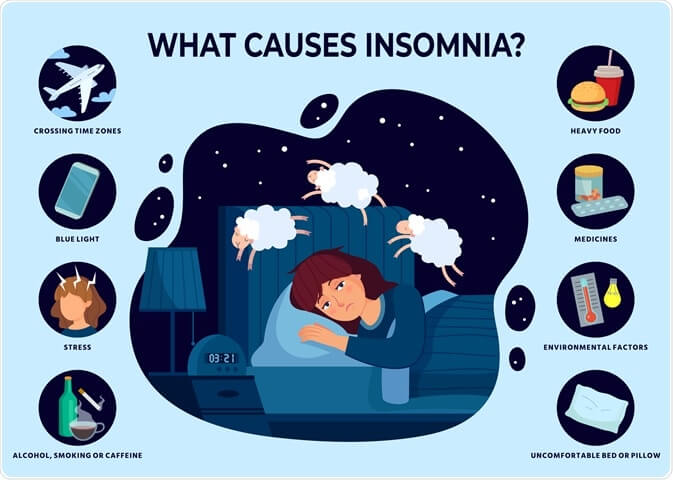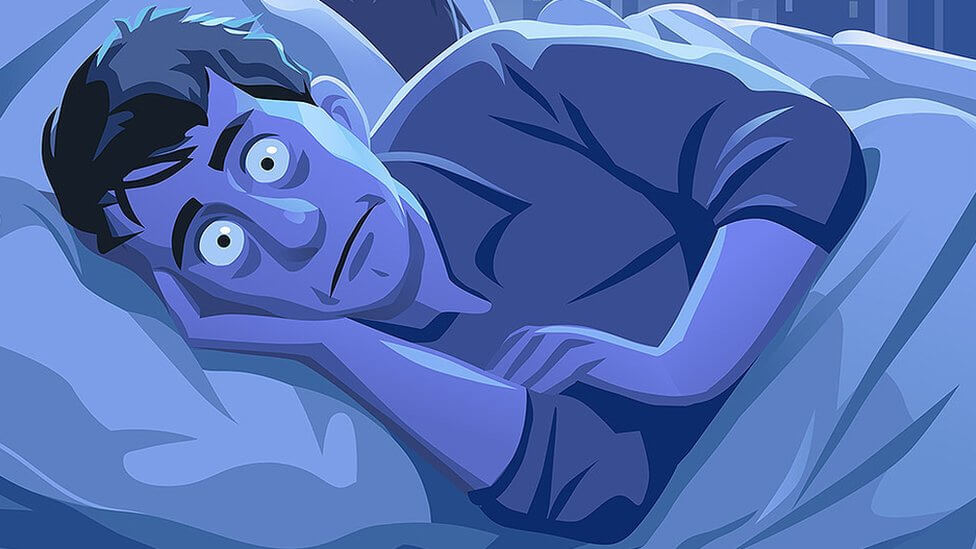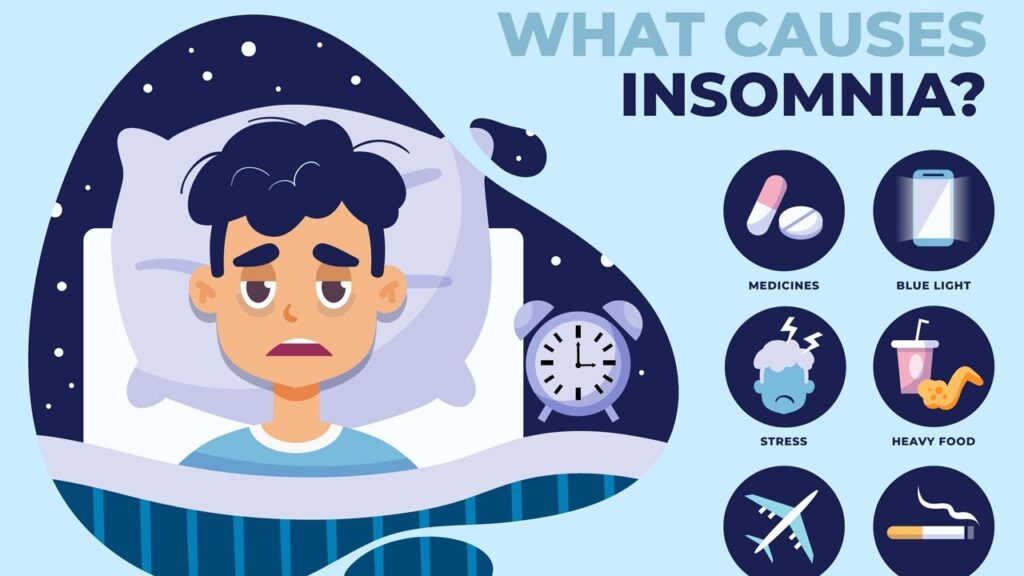Insomnia: What is It and Why is it dangerous?

Insomnia is a common sleep disorder. It is a situation where people will find it hard to fall asleep and struggle to stay asleep. Insomnia will make people wake up too early and not be able to return to sleep. Individuals who suffer from insomnia feel tired when they are awake. Insomnia will negatively impact a person’s energy level and mood. It may also affect a person’s work performance, quality of life, health, and more.
Symptoms
A person could experience short-term insomnia. This is characterized by a temporary circadian rhythm misalignment. It is often experienced by individuals who have sleep problems because of environmental factors such as shift work and more. It involves people who have initial sleep but struggle with sleep maintenance difficulties. In this case, insomnia is a symptom and not the underlying cause. There is also chronic insomnia. This is when individuals experience symptoms of insomnia for a minimum of three times a week for at least three months. This is defined by a person having adequate opportunities for sleep but still experiencing symptoms of insomnia. These are people who struggle with onset sleep as well as sleep maintenance.

Causes
A person who struggles with proper sleep may have insomnia or it could be associated with another health condition. Chronic insomnia is often caused by habits and life events that disrupt sleep. It may also be the result of stress. There have been successes when underlying causes for insomnia are treated. It is also possible for people to have insomnia for years. There are some common causes of insomnia.
*Eating too much late in the evening. There is no problem with having a light snack before going to bed. Eating too much will result in being physically uncomfortable when lying down.
*Stress – When people are worried about their finances, work, health, school, and more, it will keep their minds active at night. This will make it difficult for them to sleep. It is common for stressful life events such as illness or death of a loved one, job loss as well as divorce to cause a person to experience insomnia.
*Poor Sleep Habits – This could be engaging in stimulating activities before bed, irregular bedtime schedule, uncomfortable sleeping environment, naps, eating, using the bed as a place for video games, watching TV, being on the computer, using a smartphone, and more. All of this before bed will interfere with a person’s sleep cycle.
*Work Schedule Or Travel – A person’s circadian rhythms act as an internal clock. They will guide a person’s body through their body temperature, metabolism as well as their sleep-wake cycle. When a person’s circadian rhythms are disrupted, they will experience insomnia. This commonly happens with people with frequent changing work hours, working an early or late shift as well as jet lag from going over multiple time zones, and more.

Related Conditions
Various health conditions could result in someone experiencing insomnia. Sleep can also be affected by someone with asthma, nasal allergies, and more. Should someone experience sleep apnea, they will struggle to get proper sleep daily. They may not remember how their sleep apnea stopped their breathing and woke them up. This could happen several times each night. They will feel groggy the next day and not understand the reason for it. Dementia can cause people to be restless when they sleep. This is known as “sundown syndrome.” A person may become restless, confused, or anxious around bedtime. It is common for a woman experiencing menopause to wake up sweating more than once a night. Gastrointestinal disorders (GI) are often associated with sleep problems. It has been estimated that over 54 percent of people with a GI condition will experience insomnia. People with Parkinson’s Disease will wake up more often than others. This is because it interferes with a person’s brain and its nerve signaling.
What Improves Sleep Health?
Certain things will improve sleep for a person suffering from insomnia.
*Human Growth Hormones (HGH). When people don’t have enough HGH in their bodies, they will often wake frequently and have restless sleep. A proper level of HGH helps people go to sleep easier and sleep longer. It enables them to wake up feeling rested. Research has shown that melatonin plays a significant role in the production of HGH during sleep. Genotropin is a popular type of HGH. This therapy has enabled people with insomnia to experience the best possible sleep. As for Genotropin benefits and results, there is a very high success rate with people who are experiencing the symptoms of insomnia. Using HGH requires a blood test and prescription.
*Cognitive Behavioral Therapy (CBT). This teaches a person to recognize the changes in their life that affect their ability to sleep. It is designed to help people eliminate or control their worries and negative thoughts affecting their sleep. People learn to have good sleep habits.
*Stimulus Control Therapy (SCT). This focuses on removing things that make a person’s mind resist sleep. This involves having a consistent bedtime as well as wake time. Naps are to be avoided. The bedroom is only for sleeping and should be avoided if not feeling sleepy.
*Red Light Therapy at home. This involves a person using light when they awake too early to push back their internal clock. Some people go outside and others will use a light box.
*Relaxation Techniques (RT). This involved using biofeedback, breathing exercises, and muscle relaxation techniques to decrease bedtime anxiety. Doing this helps a person control their mood, tension, breathing, and heart rate.
Diagnosis
The diagnosis of insomnia begins with a physical exam. The goal is to detect any medical problems causing insomnia. A person’s sleep habits will then be reviewed. A person may be asked questions by a physician as well as requested to complete a questionnaire. A person may be asked to participate in a sleep study.
Prevention
There are certain habits a person can develop to prevent insomnia and experience sound sleep.
*Relaxing bedtime ritual.
*Consistent bedtime and wake time. Follow a schedule of sleep and wake times even on the weekends.
*Create a comfortable bedroom environment that encourages sleep.
*Stay active. Regular activity encourages a good night of sleep.
*Avoid large intake of food or beverages prior to bedtime.
*Review medications to make certain they don’t contribute to insomnia.
*Avoid or limit taking naps.
*Avoid or limit alcohol and caffeine. Nicotine should also be avoided.
Insomnia is a sleep disorder that can be treated. If you believe you have insomnia, it is time to contact your physician. They will provide a treatment plan that is safe and appropriate as well as based on your specific healthcare requirements.






